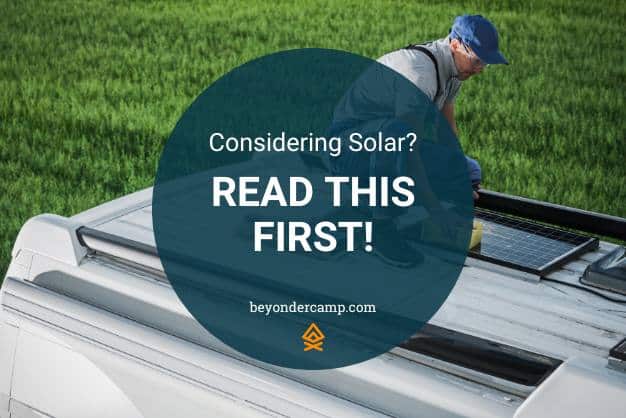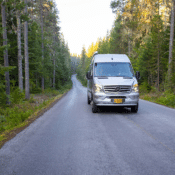Thinking About Solar For Your RV? Read This First!

Thinking About Solar For Your RV? Read This First!
As more people embrace the freedom and flexibility of RV travel, the need for sustainable and self-sufficient energy solutions becomes increasingly important. One such solution gaining popularity is the integration of solar power systems in recreational vehicles (RVs). In this blog post, we will delve into the pros and cons of adding solar to your RV, empowering you to make an informed decision about whether this green energy option is right for you.
Pros:
- Energy Independence: One of the primary advantages of incorporating solar power into your RV is the freedom it provides from traditional power sources. With solar panels, you can tap into the sun’s energy and generate electricity, reducing reliance on external hookups or generators. This independence allows you to explore remote locations or boondocking sites without worrying about access to electricity.
- Cost Savings: While the upfront cost of installing solar panels may seem significant, the long-term financial benefits can outweigh the initial investment. Solar power eliminates or significantly reduces the need to pay for campground hookups or fuel for generators, resulting in substantial savings over time. Furthermore, as solar technology continues to advance, prices are gradually becoming more affordable.
- Environmental Impact: Choosing solar power for your RV significantly reduces your carbon footprint. By harnessing renewable energy from the sun, you reduce reliance on fossil fuels and contribute to a cleaner and greener environment. RVers who embrace solar power can enjoy their travels while minimizing their impact on nature.
- Quiet and Maintenance-Free: Unlike traditional generators that produce noise and require regular maintenance, solar panels are silent and have no moving parts. Once installed, they generally require minimal upkeep, making them an attractive option for RV owners seeking peace and simplicity.
- Extended Boondocking Capability: For those who love boondocking or dry camping, adding solar to your RV extends your ability to enjoy these off-grid adventures. Solar power systems enable you to recharge your batteries and run essential appliances, such as lights, refrigerators, water pumps, and electronic devices, without depleting your energy reserves.
Cons:
- Initial Cost: One of the main drawbacks of solar power systems for RVs is the upfront cost of installation. The price varies depending on the size and complexity of the system, including the number of solar panels, batteries, and inverters required. While the long-term savings can offset this initial expense, it may still be a barrier for some RV enthusiasts.
- Limited Power Generation: While solar panels are an excellent source of renewable energy, they are subject to certain limitations. Power generation depends on the availability of sunlight, which can be affected by weather conditions, shading, and the orientation of the panels. During cloudy or shaded periods, the efficiency of the system may decrease, potentially impacting your energy reserves.
- Space Requirements: RVs often have limited roof space available for solar panel installation. Depending on the size of your vehicle and your energy needs, you may have to prioritize which appliances or systems you can power with solar energy. Additionally, large shading objects, such as trees or nearby buildings, can further restrict the optimal placement of solar panels.
- Installation and Compatibility: Installing a solar power system in an RV requires careful planning, technical knowledge, and sometimes professional assistance. Proper installation ensures optimal efficiency and prevents damage to the roof or electrical systems. Moreover, not all RVs are designed to accommodate solar panels, so it’s essential to assess compatibility before embarking on the installation process.
- Weight Considerations: Adding solar panels and batteries to your RV increases its overall weight. It’s crucial to factor in the weight distribution and the vehicle’s load capacity to maintain safe and stable driving conditions. Overloading your RV can lead to performance issues, tire wear, and potential safety hazards. Therefore, it’s essential to carefully calculate the weight of the solar equipment and ensure it aligns with your RV’s specifications.
- Maintenance and Durability: While solar panels are generally low-maintenance, they still require periodic cleaning and inspection to ensure optimal performance. Dust, debris, or bird droppings can reduce the efficiency of the panels, so regular cleaning is recommended. Additionally, extreme weather conditions, such as hail or heavy snow, can potentially damage or reduce the lifespan of solar panels if not adequately protected.
- Energy Storage Limitations: Solar power systems for RVs typically include batteries to store excess energy generated during the day. However, the storage capacity of these batteries is limited, which means you need to manage your energy usage and be mindful of power-hungry appliances. During periods of high energy demand or extended cloudy days, it’s possible to deplete your battery reserves, requiring alternative power sources or conservation measures.
Adding solar power to your RV offers numerous advantages, including energy independence, cost savings, environmental benefits, and extended boondocking capabilities. However, it’s essential to consider the upfront cost, potential limitations in power generation, space requirements, installation and compatibility challenges, weight considerations, maintenance needs, and energy storage limitations.
Before making a decision, assess your energy needs, budget, and travel preferences. Research reputable solar providers with experience in RV installations and seek professional advice if needed. Ultimately, the decision to add solar power to your RV should align with your sustainability goals, desire for self-sufficiency, and willingness to invest in a long-term energy solution that enhances your RVing experience.




